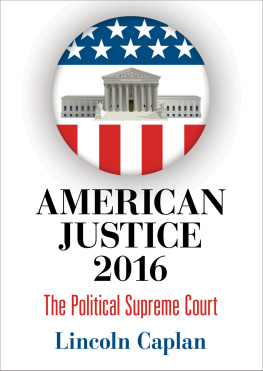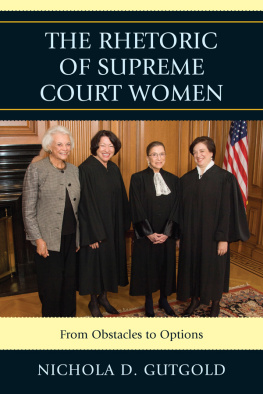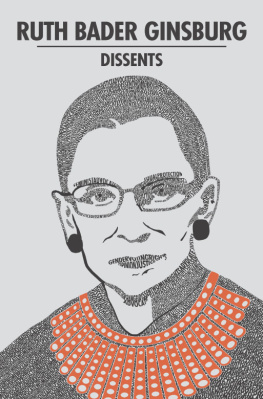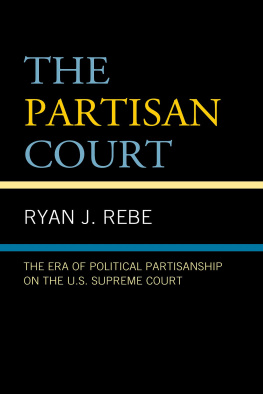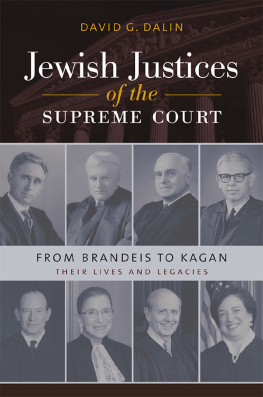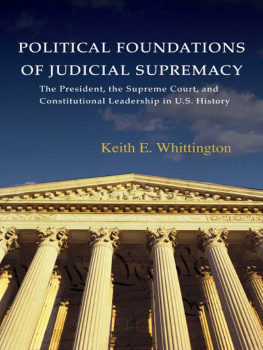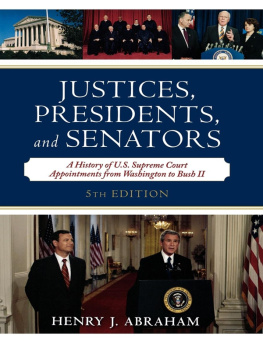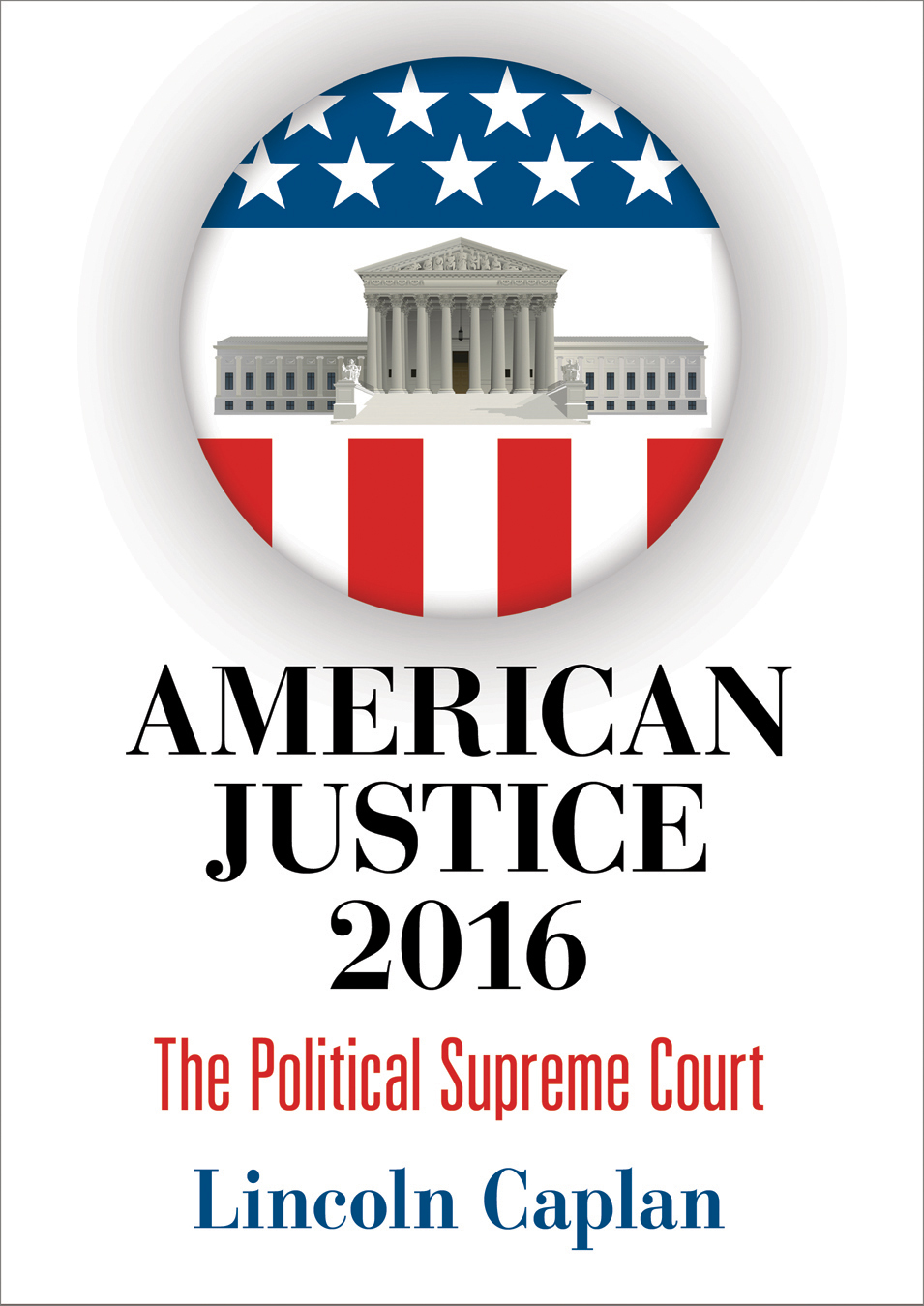
American Justice 2016
Also by Lincoln Caplan
Up Against the Law: Affirmative Action and the Supreme Court
Skadden: Power, Money, and the Rise of a Legal Empire
An Open Adoption
The Tenth Justice: The Solicitor General and the Rule of Law
The Insanity Defense and the Trial of John W. Hinckley, Jr
American Justice 2016
The Political Supreme Court
Lincoln Caplan

UNIVERSITY OF PENNSYLVANIA PRESS
PHILADELPHIA
Copyright 2016 University of Pennsylvania Press
All rights reserved. Except for brief quotations used for purposes of review or scholarly citation, none of this book may be reproduced in any form by any means without written permission from the publisher.
Published by
University of Pennsylvania Press
Philadelphia, Pennsylvania 19104-4112
www.upenn.edu/pennpress
Garrett Epps, Consulting Editor
A Cataloging-in-Publication record is available from the Library of Congress.
Cover design by John Hubbard
ISBN 978-0-8122-4890-6 (hardcover)
ISBN 978-0-8122-9372-2 (e-book)
For Rob Shapiro
Contents
Justice Ruth Bader Ginsburg gave the Supreme Court a brief but colossal jolt soon after the end of the 2015 term, when she denounced the fury-fueled candidacy of Donald Trump to be president of the United States. She called him a faker in interviews with prominent outlets in journalism and declared, I cant imagine what this place would beI cant imagine what the country would bewith Donald Trump as our President. For the country, it could be four years. For the Court, it could beI dont even want to contemplate that.
Trump retorted, I think its highly inappropriate that a United States Supreme Court judge gets involved in a political campaign, frankly. I think its a disgrace to the Court, and I think she should apologize to the Court. I couldnt believe it when I saw it. He accompanied that, predictably, with a tweet: Justice Ginsburg of the U.S. Supreme Court has embarrassed all by making very dumb political statements about me. Her mind is shotresign!
The disapproval from the liberal, Democrat-appointed Ginsburg was mild compared to what leading conservative Republicans had been saying. They called him, among other things, a race-baiting, xenophobic religious bigot; a dishonest demagogue who plays to our worst fears; and a madman. For a moment, Ginsburgs comments seemed to do no more than confirm the exceedingly abnormal nature of the 2016 election, especially of Trumps campaign.
He was carrying the Republican banner, but he was a kind of performance artist, not a politiciana self-appointed celebrity who had morphed into a tycoon as a result of being a celebrity and who was trying to pull off the same trick in politics to become the leader of the free world. Ginsburg might have thought she had a license to call him out because she had acquired some fame, too. As Notorious RBG, she was celebrated as a heroine, brilliant and brave, for standing up to the Courts conservative majority.
Even among admirers of hers, however, the moment gave way to harsh judgment. The Code of Conduct for United States Judges states that A Judge Should Refrain from Political Activity. Under General Prohibitions, it spells out that a judge should not make speeches for a political organization or candidate, or publicly endorse or oppose a candidate for public office.
The code does not bind the justices, so in the strictest sense, she did not disobey it. But Chief Justice John G. Roberts Jr. had pushed back against serious congressional pressure that the justices vote to make it binding on members of the Court, by saying that it was unnecessary because all of them already followed it. Clearly, Ginsburg did not when she sounded off.
According to the code, her public opposition to Trump as a candidate was plainly unethical. It was almost certainly grounds for a request that she recuse herself from any case reaching the Court that, like Bush v. Gore in 2000, would decide the presidency. It was arguably grounds for her recusal if Trump became president, in any Court case that would directly affect his authority.
But that was not what made Ginsburgs gaffe so unsettling. In the Los Angeles Times, the papers longtime Supreme Court correspondent David G. Savage wrote that her comments dealt a clear setback to Chief Justice John G. Roberts Jr. and his effort to keep the court separate from the poisonous partisan politics of Washington. In fact, her comments were a reminder that the Court is not separate from politics. They were unnerving, even after she apologized for them, because they raised the question of how her views on politics had influenced her votes in Court cases and how they would in the future.
The Supreme Court is a political institution. Saying that is like saying there is a global economy: both are simply facts. Some parts of this reality should not be controversial. As a body that the US Constitution requires (The judicial Power of the United States, shall be vested in one supreme Court, and in such inferior Courts as the Congress may from time to time ordain and establish.), the Court is a product of politicsof the convention that created that document and of its ratification by the states. The justices are products of politicsthe nominees of presidents elected by a majority of the electoral college, appointed with the consent of a majority of senators elected by their states.
Other parts of the reality are sometimes controversial. The Supreme Courts decisions are final, neither reviewed by nor subject to approval of another tribunal, so the Court operates differently from any other court in the United States. It usually follows its own precedents when deciding cases, but it is not bound by them the way the lower federal courts and state courts are. It has the power to put aside or overturn its own precedents, and it does. In cases where no principle of law leads to a result that all or most of the justices agree on, they draw on their views about policypolitics in its functional form.
This is the most controversial way the Court is political. The Supreme Court makes or creates law in almost all its cases, when it is interpreting a hard-to-understand portion of a federal statute and especially when it is applying a clause of the Constitution to facts its shapers could not have contemplated more than two centuries ago. In making those interpretations or applications, the justices sometimes draw on more than their legal acumen or judicial philosophy.
They draw on their prior legal experiences, whether as a prosecutor, a federal policy-maker, a scholar, or a judge; on their outlooks shaped by the family, culture, and region of the country they grew up in; and on their religious and other values, including their political ones. This politics is not always partisan: in the recent past, for example, Justices Harry A. Blackmun and John Paul Stevens, who were appointed by Republican presidents, drifted to the left during their time on the Court and, at the end of their long tenures, regularly voted for liberal outcomes. But this politics, often called ideology, involves a distinct view about how the Court should allocate basic elements of society: power, opportunity, duty, responsibility, and many others.
The ideal for the Court has long been that it should make decisions about law without regard to politics. The rule of lawthe idea that government, and not particular men or women, is empowered and constrained by lawdepends on this ideal of separation. For that reason, the Constitution gives the justices life tenure, as long as they maintain good behaviour, and guarantees that their compensation shall not be diminished during their continuance in office. They have life tenure so they will decide cases impartially, including independently of politics. They cannot be punished for their judicial decisions by having their pay cut or getting fired.
Next page
